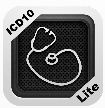With the release of Apple's iPhone 5, we decided to do a roundup of some recommended iPhone apps for medical providers. Here are 5 great iPhone apps to try out:

With translations for both English and Spanish, this is a great tool for medical travelers and those working with a Spanish speaking population of patients. It even detects misspellings and provides natural-sounding pronunciations.
ICD 10 Lite puts the complete, latest ICD 10 CM & ICD 10 PCS on your iPhone or iPod Touch or iPad. Easy to customize, share, print and even favorite certain codes.
 Medical Malpractice Insurance Resources for physicians, medical groups and healthcare professionals. Search for medical malpractice quotes by specialty and state and find out how to lower med-mal costs.
Medical Malpractice Insurance Resources for physicians, medical groups and healthcare professionals. Search for medical malpractice quotes by specialty and state and find out how to lower med-mal costs.
Medscape (by WebMD) is a leading medical resource for physicians and other healthcare providers for news and clinical information. This app features safety information for prescribing, CME tracking, article databases and much more.
If you want to search for medical apps by your profession, then this is the app for you. Enter your areas of interest and DG Apps will compile a list of apps for you to consider indexed by popularity and featuring the latest apps available.
If you're a healthcare professional, share some of your favorite medical apps by tweeting us @MedestarLocums or by leaving a comment below.
1) English - Spanish Medical Dictionary by Word Magic Software (Paid - $5.99)

With translations for both English and Spanish, this is a great tool for medical travelers and those working with a Spanish speaking population of patients. It even detects misspellings and provides natural-sounding pronunciations.
 2) ICD 10 Lite 2012 by iPremiumApps (Free)
2) ICD 10 Lite 2012 by iPremiumApps (Free)
ICD 10 Lite puts the complete, latest ICD 10 CM & ICD 10 PCS on your iPhone or iPod Touch or iPad. Easy to customize, share, print and even favorite certain codes.3) Med-Mal by Cunnigham Group (Free)
 Medical Malpractice Insurance Resources for physicians, medical groups and healthcare professionals. Search for medical malpractice quotes by specialty and state and find out how to lower med-mal costs.
Medical Malpractice Insurance Resources for physicians, medical groups and healthcare professionals. Search for medical malpractice quotes by specialty and state and find out how to lower med-mal costs.
 4) Medscape by WebMD (Free)
4) Medscape by WebMD (Free)
Medscape (by WebMD) is a leading medical resource for physicians and other healthcare providers for news and clinical information. This app features safety information for prescribing, CME tracking, article databases and much more.
 5) DG Apps by Doctor's Guide Publishing Limited (Free)
5) DG Apps by Doctor's Guide Publishing Limited (Free)
If you want to search for medical apps by your profession, then this is the app for you. Enter your areas of interest and DG Apps will compile a list of apps for you to consider indexed by popularity and featuring the latest apps available. If you're a healthcare professional, share some of your favorite medical apps by tweeting us @MedestarLocums or by leaving a comment below.





















